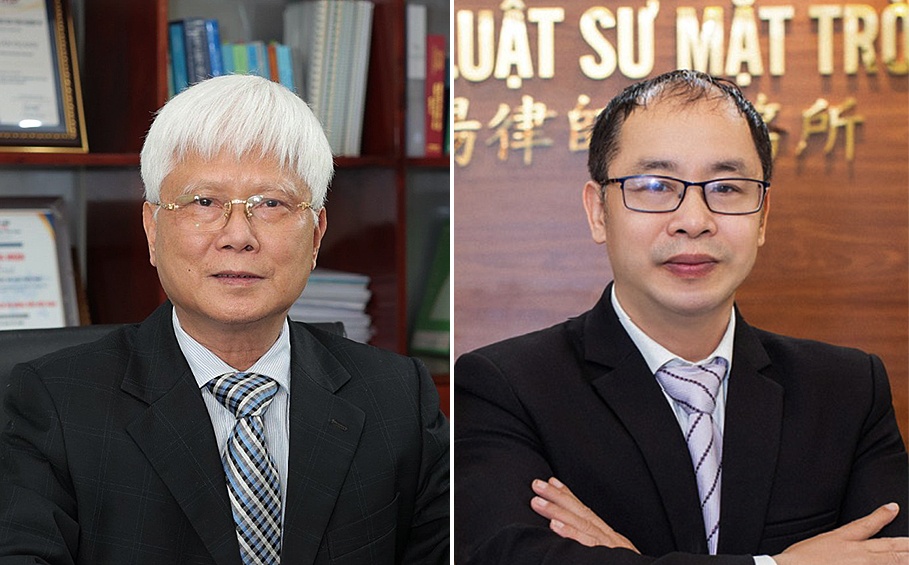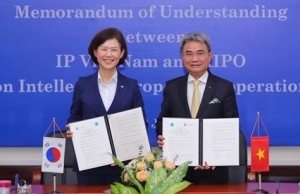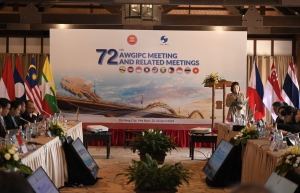Foreign-led enterprises remain confused on IP rights
Since its enactment of 2005, Vietnam’s Intellectual Property Law has undergone amendments in 2009, 2019, and most recently in 2022, enhancing its comprehensiveness and compatible with the World IP System. The revisions include clarifications regarding copyright and related rights, specifically defining the roles of authors and co-authors, delineating changes in personal rights and property rights, and introducing exceptions that do not constitute copyright infringement.
 |
| Bui Van Thanh, lawyer, New Sun Law Group (left) and Nguyen Thanh Quang, lawyer, New Sun Law Group |
Regarding the industrial property rights, there are important amendments to the criteria for examining the criterion of novelty of inventions, protecting part designs, protecting sound trademarks and registering international trademarks in Vietnam. In addition, there are important changes on rights for plant varieties, and measures to protect intellectual property rights
The amended law contributes to enhancing the effectiveness of IP support activities, notably ensuring the comprehensive and rigorous implementation of Vietnam’s international commitments on intellectual property protection during the integration process.Furthermore, Vietnam’s current legal documents on intellectual property are considered mostly complete, with a full range of intellectual property protection objects compared to developed countries.
Vietnam also integrates deeply and widely with world intellectual property by participating in many international conventions and treaties, such as the Berne Convention for Protection of Literary and Artistic Works, Paris Convention for the protection of industrial property, Patent Cooperation Treaty for protection of International patents, and Madrid Agreement and Madrid Protocol on trademarks.
Vietnam also completed documents under the laws, such as on intellectual property, civil procedures, and tech transfers as well as takes part in well over a dozen free trade agreements.
Despite the completeness of the legal framework, foreign investors encounter numerous obstacles during the process of registration and protection of their IP rights. Notably, the enterprises take a much longer time compared to provisions to registering their IP rights. Normally, according to the regulations, it takes 18 months from the publication date or the date of examination request to get the patent, however, in reality, it takes three to four years.
To get a trademark examination result, it takes two to three years, while the law stipulates no more than nine months. Regarding the copyright, the time limit for granting a copyright registration certificate is within 15 days, but it takes two to six months in practice. The Copyright Department’s registration division also does not notify in writing in case of errors, and this is usually carried out over the phone, which shows this agency’s lack of professionalism and compliance with the law.
The enforcement of IPRs still has many shortcomings. There are two groups of measures with specific measures for protecting and enforcing IPRs. The first group is self-protection measures and the second involves legal measures including civil, administrative, and criminal measures.
Administrative measures to handle violations now are still considered the most effective solution. If the investors want to sue or request compensation for their damages, they must prove the actual damage caused by the infringement with complicated and difficult procedures. Meanwhile, the procedures to handle administrative violations will be simple, quick, and especially suitable for stopping infringementsquickly.
However, enforcing the administrative measure also has several barriers. Rights holders of industrial property rights often have to collect evidence of infringement themselves, then send it to the Division of Market Management or Inspector of the Ministry of Science and Technology. This is difficult work because of the requirements to identify violations in production facilities for patents/trademarks.
The inspection and having a conclusion about the signs of infringement is a mandatory basis in handling infringement. However, when the property right subjects submit the appraisal results to the authorities, they will also require re-examination procedures at the Institute of Intellectual Property Science, to compare with the original protection label in the existing appraisal conclusion. This requirement of the authorities incurs additional costs and time for the rights holder.
The imposition of additional sanctions remains inadequate. For instance, businesses found violating trademarks face only temporary suspensions of operations and production for one to three months, a measure often deemed insufficient. Rights holders seek immediate cessation of infringements with assurances against future recurrence.
Furthermore, there are limitations in enforcing civil measures. Burdens of proof lie heavily on property rights holders, particularly in demonstrating psychological harm, typically a responsibility of regulatory authorities. Quantifying actual damages resulting from infringements is complex, complicating determination of appropriate compensation.
 | Lessons to learn regarding intellectual property issues According to the ranking of the 100 most valuable brands globally published in 2020 by UK-based brand ranking and consulting company Interbrand, the United States was the country with the most intellectual property assets. Specifically, in the top five most valuable brand names in the world, there are four American brands in the technology sector. Although it was reported last year that Apple is now worth over $2 trillion in market value, its brand value is estimated to be around $322 billion, which is nearly equivalent to Vietnam’s 2019 GDP. |
 | Intellectual property key to innovation-driven economy Intellectual property is playing an increasing role in accelerating innovation and creativity. Andrew Ong, Asia-Pacific director for the World Intellectual Property Organization, talked to VIR's Bich Thuy about the issue, and the role of women in the process. |
 | Vietnam, RoK boost intellectual property cooperation The Intellectual Property Office of Vietnam (IPO) under the Ministry of Science and the Korean Intellectual Property Office (KIPO) of the Republic of Korea (RoK) signed a Memorandum of Understanding (MoU) on strengthening intellectual property cooperation at a ceremony on June 22 in Hanoi. |
 | ASEAN meeting on intellectual property cooperation opens The 72nd meeting of the ASEAN Working Group on Intellectual Property Cooperation (AWGIPC) is taking place in Vietnam’s central city of Danang on April 22-26. |
What the stars mean:
★ Poor ★ ★ Promising ★★★ Good ★★★★ Very good ★★★★★ Exceptional
Related Contents
Latest News
More News
- Citi economists project robust Vietnam economic growth in 2026 (February 14, 2026 | 18:00)
- Sustaining high growth must be balanced in stable manner (February 14, 2026 | 09:00)
- From 5G to 6G: how AI is shaping Vietnam’s path to digital leadership (February 13, 2026 | 10:59)
- Cooperation must align with Vietnam’s long-term ambitions (February 13, 2026 | 09:00)
- Need-to-know aspects ahead of AI law (February 13, 2026 | 08:00)
- Legalities to early operations for Vietnam’s IFC (February 11, 2026 | 12:17)
- Foreign-language trademarks gain traction in Vietnam (February 06, 2026 | 09:26)
- Offshore structuring and the Singapore holding route (February 02, 2026 | 10:39)
- Vietnam enters new development era: Russian scholar (January 25, 2026 | 10:08)
- 14th National Party Congress marks new era, expands Vietnam’s global role: Australian scholar (January 25, 2026 | 09:54)

 Tag:
Tag:



















 Mobile Version
Mobile Version